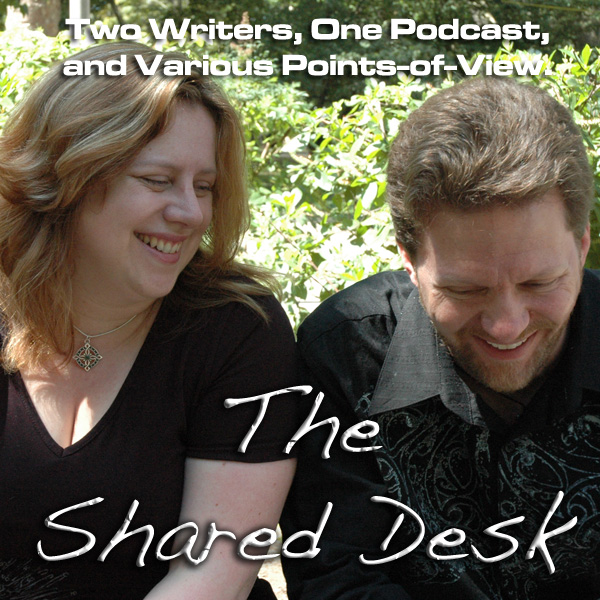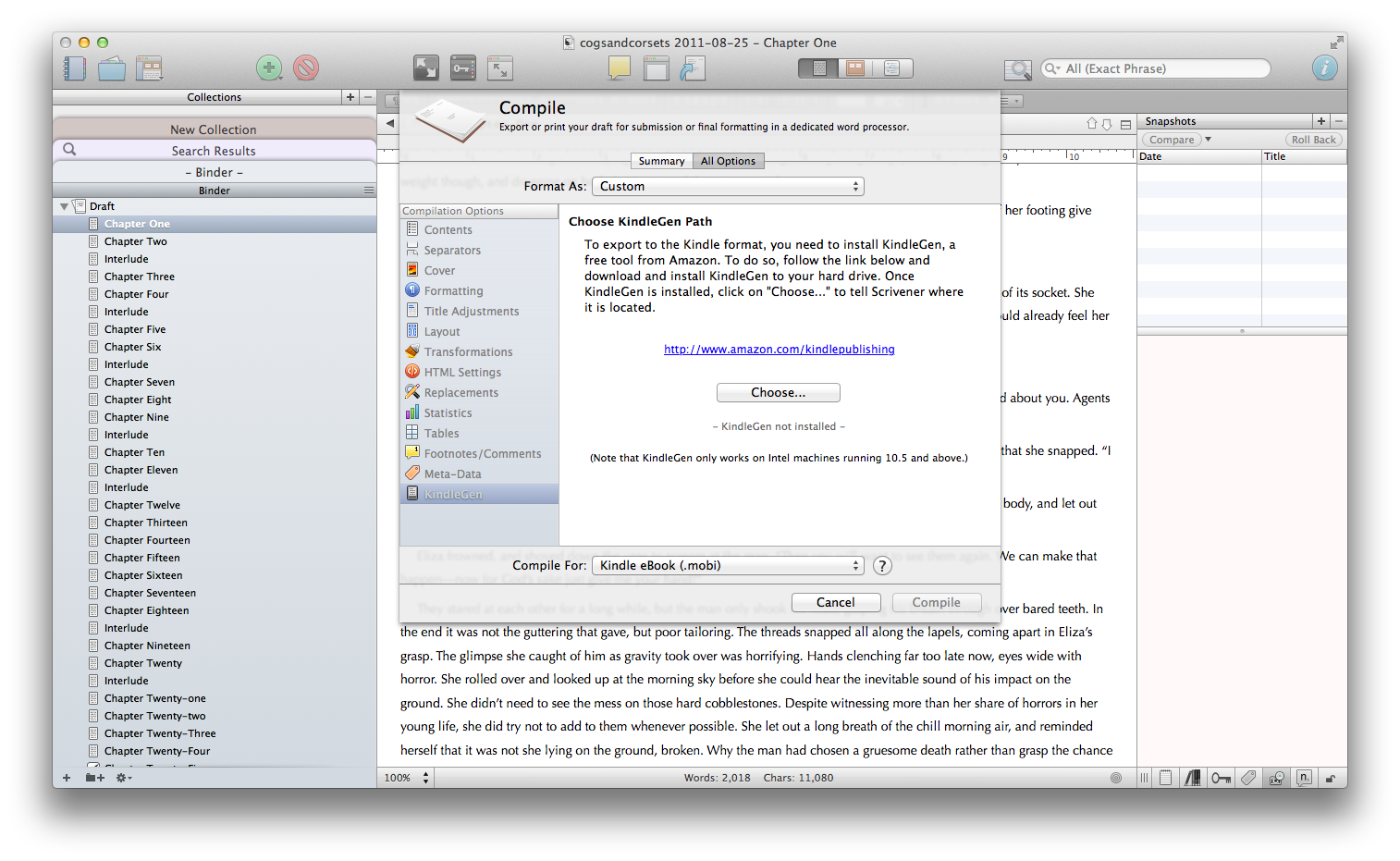Yes we wound up being a day late on this show, but as you will hear in the end we have been anything but idle. This episode is all about Scrivener, that popular software authors swear by. Tee and Pip share their likes, dislikes, and future possibilities for the application, and then Tee shares a rant about Seth Godin and a liberal use of the C-word.
UPDATE: With special thanks to Steve Saylor, we have discovered that YES, you can export your Scrivener works in digital publishing formats. Under the “File” menu, scroll down to “Compile” (keyboard shortcut is Option + Command for the Mac) and select from the sub-menu of “Compile for:” the “Kindle” option. (Click on the image for a larger version.)
Well played, Scrivener. Well played.UPDATE: And with extra special thanks to Nobilis Reed, we have discovered that Scrivener has a Linux version, currently in Beta.
00:00 — Introduction
- A voicemail from Dan Shurette that provides Tee & Pip with instpiration
- The show launches with a moment’s pwnage!
01:49 — All About Scrivener
- And the show kicks off with Tee giving the wrong URL for Literature and Latte.
- Scrivener makes TechRadar’s Top Ten Most Loved Programs
- Scrivener ranks #9 between Lotus 1-2-3 and Solitaire.
- Tee reads off the other Top Ten
- Tee’s Metallica impersonations still hold up apparently.
- Also on the list — Fotoshop (for fashion models everywhere!)
- When did we find Scrivener?
- What Pip Likes: Keeping all your notes, thoughts, and research in one file
- The price of Scrivener — $45USD
- What Tee Likes: The Research Mode and the ability to import web pages
- What Tee & Pip Like: The Corkboard
- What Pip Likes: Rearranging chapters with a click-and-drag ease
- Pip calls for the put-down of the Courier font.
- What Tee Likes: Comments
- What Pip Likes: Customizing your workspace
- What Tee Would Like to See: A “Track Changes” Feature
- What Pip Would Like to See: More “Export Options”
- What Tee Likes: Project and Text Statistics
- What Tee Would Like to See: More people in the industry using Scrivener
- What Tee Would Like to See: An easy transition between Mac, Windows, and Linux platforms
- Getting schooled by Scrivener: A history that Tee and Pip didn’t know….
- What Tee Can’t Wait to See: Scrivener for the iPad
31:22 — Seriously, Seriously: Going for the Godin
- Seth Godin…using his evil powers to mess with Tee’s mic
- So what does Tee have against Seth Godin? (Just listen….)
- What Tee doesn’t get: When the Press and Bloggers Rally around Seth Godin
- An excerpt from Seth Godin’s “Who Decides What Gets Sold” from The Domino Project
- Pip finds out Godin doesn’t write books. He writes manifestos.
- And Tee winds up…
- Seth Godin is not being censored. He’s trying to take advantage of Apple.
- Tee then goes off…and goes…and goes…and goes….
- And here’s the post that gets Tee going EVEN HARDER…
41:15 — The Wrap-Up
- A moment of silence and some reflection for the Encyclopedia Britannica
- A call for your feedback and your voicemail. If we get enough feedback, we will bump up our Listener Appreciation show to Show #15. Comment, send us voicemail, and let’s talk!
- What’s coming up for us…
- Digital arcs are coming of The Janus Affair: A Ministry of Peculiar Occurrences Novel
- Pip announces the wrap-up show we’ll do in 2013 concerning EXPERIMENT 2012
- Pip releases her first novella, Magic by Gaslight
- Tee releases The Case of the Singing Sword, and makes a conditional promise concerning new mysteries from the dwarf detective.
- Aladdin and His Wonderfully Infernal Device
still online and waiting for you at Amazon. (Other formats coming soon.)
- Tales from the Archives: Volume 2 launches on April 10 with new stories from the Ministry of Peculiar Occurrences
- And between Pip’s family visiting, the Steampunk World’s Fair, Balticon, their May is done.
- …and after Pip shows up Tee on the Creative Commons tag, Tee breaks into Key & Peele to try and save face.
- Stone Design, the people behind Twittelator
- Web Pro News
leave us a voicemail or question for the show at 703.791.1701,
or leave us a comment here at the blog.



It’s not quite the same as Track Changes, but I find Scrivener’s Snapshots feature to have some of the same functionality. You can take snapshots of the document at different stages, compare two versions, roll back to a previous version, etc. It’s one of my favorite Scrivener features.
Also, my version of Scrivener does have compile options for .epub and .mobi (in the dropdown menu below the standard file types).
Thanks for a great podcast, I’ve really been enjoying the show!
Pingback: The Shared Desk — All About Scrivener | Everything Scrivener
And you didn’t even mention the review on Scrivener that Pip did for The Nifty Tech blog?
Doc
In defense of Courier…
Between 2004 and 2006 my wife and I ran a non-profit audio theater company. In that time we wrote, directed, recorded, and produced over 40 hours of audio drama and engaged over 200 volunteers, including a writing team.
It was vital that we stayed within a certain time constraint so consistency in script length became an important factor. Using a carefully designed set of styles in MS Word, we were able to know for certain that a 23 page script would fit almost perfectly into a 1/2 hour (with intro, outro, and station break).
The only reason that was possible was due to the uniformity of the Courier font. Every keystroke of Courier takes up exactly the same amount of space (it is a monospace font) ensuring the consistency required.
To this day, when I see Courier, my mind kicks (happily) into production mode. And I’m not alone. Ask any screenwriter and they’ll tell you 12pt Courier is the industry standard for screenplays.
While it may not have the allure of other more “modern” fonts, it is the workhorse of any industry where scripts are the primary mechanism for transporting the story to its final form. Spurn it at your peril. 😉
Thanks for stepping up for Courier! I can see the consistency of the font would be good for screenwriters, but for novelists (well at this one) I like a more attractive font. My personal favourite is Times New Roman 🙂
Hi Tee and Pip,
I love the podcast, and after listening to your comments about Scrivener in this episode I downloaded the trial version last night to try it out. I’ve heard Mur Lafferty talk about it for years, but that was back when it was only available for the Mac. With its editing and outlining functions I can easily see Scrivener becoming my new best friend.
I also loved Tee’s rant about Seth Godin. That guy needs knocking down a peg or two. It’s never censorship when a business refuses to sell a product.
I have to say I didn’t have a problem with Seth’s essay about not needing permission and gatekeepers. I thought that was very impowering. And his example about Amanda Hocking isn’t negated by the fact that she decided to go with a major publisher. She signed a contract with a mainstream publisher for two books because she was tired of doing covers and promoting and all the other stuff that comes with being an indie, and I hope she’s happy with her decision. For the money she’s bringing in by publishing on her own, she could’ve easily hired an editor and a cover designer and even a publicist and gone right back to the keyboard doing what she loves to do best. Writers who are looking for permission or for someone to take care of them will continue to be taken advantage of. Writing is a business. It ain’t sexy, it’s not romantic, but at the end of the day that’s what it is.
Anyway, love the podcast. Keep using the drop-ins, Tee, no matter what Pip says. : )
The Tick! If I did not love you already, I would love you for the the Tick drop-ins!
Thanks for the Scrivener stuff, too – I’ve been debating on it for a while. The ability to find repeated words may be the final thing that tips me over.
Great week! I really enjoyed learning about Scrivener, and might have to come back here to listen again in the future. A friend and I have thought about giving this a go, but didn’t know much about it. I had to share this podcast with her so she can learn too.
SweeeeT! So glad to hear Tales from the Archives 2 is coming soon. 🙂
And I was hoping Magic by Gaslight would become more, even if done through novella size reads. I wanted more in the end. 😀 Thank you!
Tee, I love the rant, but you couldn’t be more wrong on the Seth Godin issue, because I think you mistake the basic issue at stake (and, to be fair, Godin might have framed the wrong issue–I’ve not read the post).
The core issue is antitrust troubles. Apple’s already under Federal investigation for price fixing and collusion. The wealthiest company in the *world* is, rather than competing in an open access field, colluding with publishers to attempt to shut out another competitor. That’s a big deal, like felony-level big deal.
The censorship issue is another important one, and it’s one that Apple’s got a long history of censoring their developers, but on the issue of commercial links I don’t think it applies (so I agree with you insofar as that goes).
By the way, “manifesto” is a literary genre, it’s not a poncy bit of self-importance.
On the subject of his “Pick Yourself” post, I honestly can’t see what got you so annoyed. Sure, Godin’s is 80% motivational rhetoric wrapped around a few basic facts, and I (like you) find motivational crap annoying as hell, but he ain’t wrong on any of the facts there. He’s right that the industry is in the process of radical change, that gatekeepers have lost their hold–probably semi-permenantly or permanently. He’s right that most writers (and artists, as this gatekeeper dissolution has been a fact of life in music for a decade and is starting to happen in film/TV) are going to have trouble adjusting to that and might need the occasional kick in the pants. We’ve got 70 years of an industry where we audition before gatekeepers to gain market access, and approval-seeking has thus been drilled into us since we all started writing short stories in elementary school. Failing to shake the gatekeeper-worshipping attitude and adopt a more pragmatic approach is bad business.
In other words, the point of Godin’s post is *more* dead-on than it was when he wrote it a bit over a year ago (it’s also worth pointing out that Hocking is still self-pubbing and is still doing quite well with it, in addition to her St. Martin’s Deal).
FWIW
-Dan
Pingback: Scrivener, Headings and Prologues | J R Merlin . com
Pingback: You Wanna See Something Really Scary: A Fresh Horror from Tee Morris | TeeMorris.com